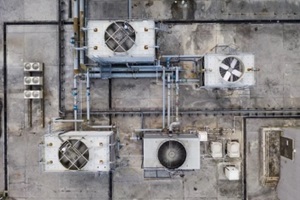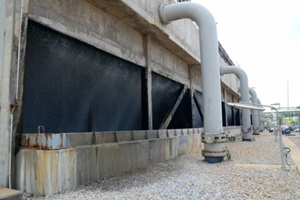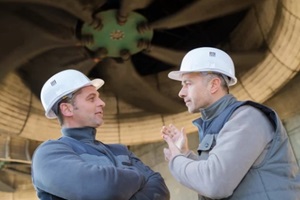 In the face of increasingly frequent and intense heatwaves, building owners and managers in the tri state area must prioritize the efficiency and reliability of their HVAC systems. Central to this effort is the often-overlooked aspect of water treatment, particularly for cooling towers. Proper water treatment is not just a maintenance task; it’s a critical strategy for ensuring system performance, energy efficiency, and regulatory compliance.
In the face of increasingly frequent and intense heatwaves, building owners and managers in the tri state area must prioritize the efficiency and reliability of their HVAC systems. Central to this effort is the often-overlooked aspect of water treatment, particularly for cooling towers. Proper water treatment is not just a maintenance task; it’s a critical strategy for ensuring system performance, energy efficiency, and regulatory compliance.
Challenges Posed by Extreme Heat Events
Heatwaves present unique challenges to HVAC systems, exacerbating existing issues and potentially leading to system failures. Common problems include increased scale formation due to higher water temperatures, accelerated corrosion rates in system components, and enhanced microbial growth, including the risk of Legionella proliferation.
These issues can lead to reduced heat transfer efficiency and increased energy consumption. Moreover, equipment damage may occur as systems overwork to meet escalating cooling demands. If left unaddressed, these issues can result in significant consequences such as skyrocketing energy costs, expensive emergency repairs, and potential health hazards for building occupants.
How Does the Summer Heat Strain Cooling Tower Systems?
Summer heatwaves place extraordinary demands on cooling tower systems, often pushing them to their operational limits. The increased ambient temperatures lead to higher water temperatures within the system, dramatically accelerating evaporation rates, and concentrating dissolved solids in the circulating water.
This concentration effect can quickly lead to scale formation on heat exchange surfaces, reducing thermal efficiency and increasing energy consumption. The combination of elevated temperatures and concentrated conditions creates an ideal environment for microbial growth, including potentially harmful bacteria like Legionella.
Additionally, the increased system demand during heatwaves means cooling towers operate for longer periods, often with higher water flow rates, which can exacerbate corrosion issues and mechanical wear on system components. These factors collectively contribute to reduced cooling capacity precisely when it’s needed most, potentially leading to system failures and costly downtime.
Optimizing Water Treatment and Vigilance for Heatwave Resilience
To combat the challenges posed by extreme heat, implementing a complete water management plan is crucial. Automated chemical feed systems with real-time monitoring capabilities ensure treatment levels adjust automatically to changing water chemistry, maintaining optimal protection.
Installing side-stream filtration systems can also help manage the increased concentration of suspended solids, reducing the risk of fouling and maintaining system efficiency during high-demand periods. Regular bi-annual cooling tower cleanings are also critical for effective system care.
 Typically performed in spring and fall, a thorough cleaning will remove accumulated scale, sediment, and biofilm that can severely impair cooling efficiency during high-demand periods. Additionally, scheduling a mid-summer disinfection can provide an extra layer of protection against microbial growth, particularly Legionella, which thrives in the warm conditions created by heatwaves.
Typically performed in spring and fall, a thorough cleaning will remove accumulated scale, sediment, and biofilm that can severely impair cooling efficiency during high-demand periods. Additionally, scheduling a mid-summer disinfection can provide an extra layer of protection against microbial growth, particularly Legionella, which thrives in the warm conditions created by heatwaves.
This proactive approach not only ensures optimal system performance during the hottest months but also contributes to long-term equipment longevity and regulatory compliance. Daily walkthroughs for building staff become even more critical during heatwaves for early problem detection and emergency prevention. Facility managers should be alert to changes during inspections.
Monitoring the temperature differential between the cooling tower’s inlet and outlet can provide early warning of reduced heat transfer efficiency. Unexpected increases in make-up water consumption might indicate excessive evaporation or leaks requiring immediate attention. By staying vigilant and addressing these signs promptly, building managers can maintain cooling system performance even during the most challenging heat events.
The Critical Role of a Trusted Water Treatment Partner
Partnering with a reputable water treatment service provider is crucial for both immediate issue prevention and long-term system health. By implementing proactive maintenance strategies and leveraging real-time monitoring capabilities, a skilled partner can identify and mitigate potential problems before they escalate into emergencies, ensuring uninterrupted operation even during extreme heat events.
The benefits of such a partnership extend far beyond short-term crisis prevention. A trusted water treatment service can significantly extend the lifespan of cooling tower systems through optimized chemical treatments, regular assessments, and data-driven recommendations for system improvements.
This comprehensive approach not only reduces the frequency of repairs and replacements but also enhances overall energy efficiency, leading to substantial cost savings for building owners and managers over time. Moreover, professional partners ensure consistent compliance with evolving regulations, protecting property owners from potential legal and financial risks associated with non-compliance.
Trust the Pros During Peak Cooling
 Ensure your cooling towers are fully prepared to withstand the intense northeast heatwaves. With professional water treatment services and cutting-edge monitoring solutions, you can prevent emergencies, extend system lifespan, and safeguard your building’s comfort and safety during the most challenging weather conditions. Tower Water is a regional leader in comprehensive cooling tower management and advanced water treatment services throughout the northeast.
Ensure your cooling towers are fully prepared to withstand the intense northeast heatwaves. With professional water treatment services and cutting-edge monitoring solutions, you can prevent emergencies, extend system lifespan, and safeguard your building’s comfort and safety during the most challenging weather conditions. Tower Water is a regional leader in comprehensive cooling tower management and advanced water treatment services throughout the northeast.
We offer expert chemical treatments, real-time monitoring systems, and proactive maintenance strategies tailored to your building’s unique needs. Ready to fortify your cooling tower systems against summer heat stress? Contact Tower Water at (212)-518-6475, call us toll-free at (888)-539-1559, or schedule a consultation online. Let us help you navigate the summer’s challenges and ensure your building stays cool.
